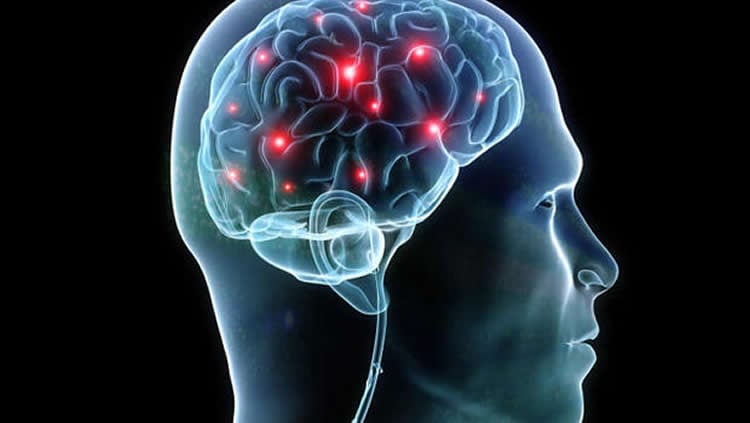The brain’s effect on other parts of the body has been well established. Now, a group that includes two University of Florida Health researchers has found that it’s a two-way street: Body fat can send a signal that affects the way the brain deals with stress and metabolism.
While the exact nature of those signals remains a mystery, researchers say simply knowing such a pathway exists and learning more about it could help break a vicious cycle: Stress causes a desire to eat more, which can lead to obesity. And too much extra fat can impair the body’s ability to send a signal to the brain to shut off the stress response.
The findings are important and unique because they show that it’s not simply the brain that drives the way the body responds to stress, said James Herman, Ph.D., a co-author of the paper and a professor in the department of psychiatry and behavioral neuroscience at the University of Cincinnati,.
“It moved our understanding of stress control to include other parts of the body. Before this, everyone thought that the regulation of stress was mainly due to the brain. It’s not just in the brain. This study suggests that stress regulation occurs on a much larger scale, including body systems controlling metabolism, such as fat,” Herman said.
The findings, which reveal a novel fat-to-brain feedback network, were published in the June edition of the journal Psychoneuroendocrinology by a group that included Annette D. de Kloet, Ph.D., a research assistant professor in the UF College of Medicine’s department of physiology and functional genomics, and Eric Krause, Ph.D., an assistant professor in the UF College of Pharmacy’s department of pharmacodynamics.
Researchers found that a glucocorticoid receptor in fat tissue can affect the way the brain controls stress and metabolism. Initially, such signals from the receptor can be lifesavers, directing the brain to regulate its energy balance and influencing stress responses in a beneficial way.
“The stress response in the short term is adaptive. It’s going to help you cope with stress,” Krause said. “The idea that fat is actually talking to the brain to dampen stress is new.”
The researchers found that steroid hormones known as glucocorticoids activate their receptors within fat tissue in a way that affects a main component of the metabolic stress response. Using mouse models, they found a unique connection between glucocorticoid signaling in fat tissue and the brain’s regulation of energy balance and stress response. Because glucocorticoid signaling is crucial to regulating the hypothalamic-pituitary-adrenal axis, fat tissue can directly affect central nervous system functions that link obesity, metabolic disease and stress-related problems, researchers concluded.

Understanding fat-to-brain signaling is a first step toward someday being able to influence the broad, complex relationship between stress, obesity and metabolism. Herman credited de Kloet for pressing the search for a fat-to-brain signaling network.
Now that researchers have established that a fat-to-brain signaling pathway exists, a fuller understanding of how it functions could someday lead to drugs or other therapies that ward off the negative effects of long-term stress.
“The big question is the nature of that signal to the brain. We need to learn how to go in and break that cycle of stress, eating and weight gain,” Herman said.
Funding: The research was funded by National Institutes of Health grants MH069860, MH049698 and NS068122.
Source: University of Florida
Image Credit: The image is credited to the Allan Ajifo and is licensed CC by 2.0
Original Research: Abstract for “Adipocyte glucocorticoid receptors mediate fat-to-brain signaling” by Annette D. de Kloet, Eric G. Krause, Matia B. Solomon, Jonathan N. Flak, Karen A. Scott, Dong-Hoon Kim, Brent Myers, Yvonne M. Ulrich-Lai, Stephen C. Woods, Randy J. Seeley, and James P. Herman in Psychoneuroendocrinology. Published online June 2015 doi:10.1016/j.psyneuen.2015.03.008
Abstract
Adipocyte glucocorticoid receptors mediate fat-to-brain signaling
Stress-related (e.g., depression) and metabolic pathologies (e.g., obesity) are important and often co-morbid public health concerns. Here we identify a connection between peripheral glucocorticoid receptor (GR) signaling originating in fat with the brain control of both stress and metabolism. Mice with reduced adipocyte GR hypersecrete glucocorticoids following acute psychogenic stress and are resistant to diet-induced obesity. This hypersecretion gives rise to deficits in responsiveness to exogenous glucocorticoids, consistent with reduced negative feedback via adipocytes. Increased stress reactivity occurs in the context of elevated hypothalamic expression of hypothalamic–pituitary–adrenal (HPA) axis-excitatory neuropeptides and in the absence of altered adrenal sensitivity, consistent with a central cite of action. Our results identify a novel mechanism whereby activation of the adipocyte GR promotes peripheral energy storage while inhibiting the HPA axis, and provide functional evidence for a fat-to-brain regulatory feedback network that serves to regulate not just homeostatic energy balance but also responses to psychogenic stimuli.
“Adipocyte glucocorticoid receptors mediate fat-to-brain signaling” by Annette D. de Kloet, Eric G. Krause, Matia B. Solomon, Jonathan N. Flak, Karen A. Scott, Dong-Hoon Kim, Brent Myers, Yvonne M. Ulrich-Lai, Stephen C. Woods, Randy J. Seeley, and James P. Herman in Psychoneuroendocrinology. Published online June 2015 doi:10.1016/j.psyneuen.2015.03.008






